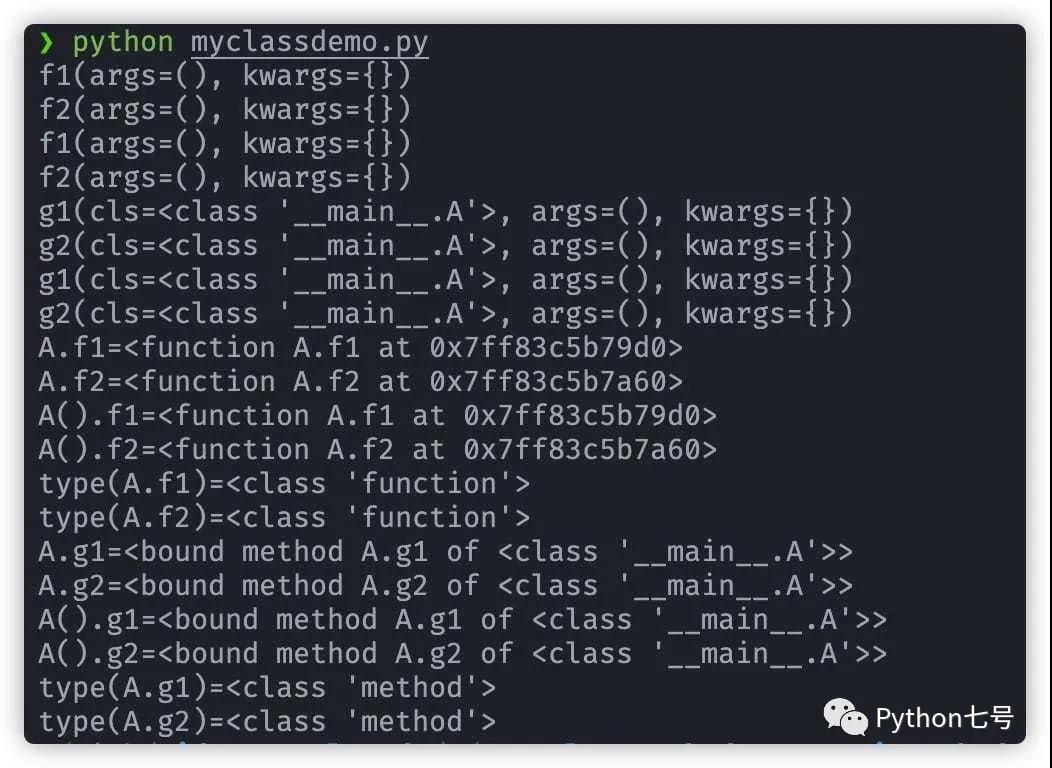為什么 Classmethod 比 Staticmethod 更受寵?
我們知道,classmethod 和 staticmethod 都可以作為函數的裝飾器,都可用于不涉及類的成員變量的方法,但是你查一下 Python 標準庫就會知道 classmethod 使用的次數(1052)要遠遠多于 staticmethod(539),這是為什么呢?
這就要從 staticmethod 和 classmethod 的區別說起。
1、從調用形式上看,二者用法差不多
先說下什么是類,什么是實例,比如說 a = A(),那么 A 就是類,a 就是實例。
從定義形式上看,clasmethod 的第一個參數是 cls,代表類本身,普通方法的第一個參數是 self,代表實例本身,staticmethod 的參數和普通函數沒有區別。
從調用形式上看,staticmethod 和 classmethod 都支持類直接調用和實例調用。
- class MyClass:
- def method(self):
- """
- Instance methods need a class instance and
- can access the instance through `self`.
- """
- return 'instance method called', self
- @classmethod
- def classmethod(cls):
- """
- Class methods don't need a class instance.
- They can't access the instance (self) but
- they have access to the class itself via `cls`.
- """
- return 'class method called', cls
- @staticmethod
- def staticmethod():
- """
- Static methods don't have access to `cls` or `self`.
- They work like regular functions but belong to
- the class's namespace.
- """
- return 'static method called'
- # All methods types can be
- # called on a class instance:
- >>> obj = MyClass()
- >>> obj.method()
- ('instance method called', <MyClass instance at 0x1019381b8>)
- >>> obj.classmethod()
- ('class method called', <class MyClass at 0x101a2f4c8>)
- >>> obj.staticmethod()
- 'static method called'
- # Calling instance methods fails
- # if we only have the class object:
- >>> MyClass.classmethod()
- ('class method called', <class MyClass at 0x101a2f4c8>)
- >>> MyClass.staticmethod()
- 'static method called'
2、先說說 staticmethod。
如果一個類的函數上面加上了 staticmethod,通常就表示這個函數的計算不涉及類的變量,不需要類的實例化就可以使用,也就是說該函數和這個類的關系不是很近,換句話說,使用 staticmethod 裝飾的函數,也可以定義在類的外面。我有時候會糾結到底放在類里面使用 staticmethod,還是放在 utils.py 中單獨寫一個函數?比如下面的 Calendar 類:
- class Calendar:
- def __init__(self):
- self.events = []
- def add_event(self, event):
- self.events.append(event)
- @staticmethod
- def is_weekend(dt:datetime):
- return dt.weekday() > 4
- if __name__ == '__main__':
- print(Calendar.is_weekend(datetime(2021,12,27)))
- #output: False
里面的函數 is_weekend 用來判斷某一天是否是周末,就可以定義在 Calendar 的外面作為公共方法,這樣在使用該函數時就不需要再加上 Calendar 這個類名。
但是有些情況最好定義在類的里面,那就是這個函數離開了類的上下文,就不知道該怎么調用了,比如說下面這個類,用來判斷矩陣是否可以相乘,更易讀的調用形式是 Matrix.can_multiply:
- from dataclasses import dataclass
- @dataclass
- class Matrix:
- shape: tuple[int, int] # python3.9 之后支持這種類型聲明的寫法
- @staticmethod
- def can_multiply(a, b):
- n, m = a.shape
- k, l = b.shape
- return m == k
3、再說說 classmethod。
首先我們從 clasmethod 的形式上來理解,它的第一個參數是 cls,代表類本身,也就是說,我們可以在 classmethod 函數里面調用類的構造函數 cls(),從而生成一個新的實例。從這一點,可以推斷出它的使用場景:
當我們需要再次調用構造函數時,也就是創建新的實例對象時
需要不修改現有實例的情況下返回一個新的實例
比如下面的代碼:
- class Stream:
- def extend(self, other):
- # modify self using other
- ...
- @classmethod
- def from_file(cls, file):
- ...
- @classmethod
- def concatenate(cls, *streams):
- s = cls()
- for stream in streams:
- s.extend(stream)
- return s
- steam = Steam()
當我們調用 steam.extend 函數時候會修改 steam 本身,而調用 concatenate 時會返回一個新的實例對象,而不會修改 steam 本身。
4、本質區別
我們可以嘗試自己實現一下 classmethod 和 staticmethod 這兩個裝飾器,來看看他們的本質區別:
- class StaticMethod:
- def __init__(self, func):
- self.func = func
- def __get__(self, instance, owner):
- return self.func
- def __call__(self, *args, **kwargs): # New in Python 3.10
- return self.func(*args, **kwargs)
- class ClassMethod:
- def __init__(self, func):
- self.func = func
- def __get__(self, instance, owner):
- return self.func.__get__(owner, type(owner))
- class A:
- def normal(self, *args, **kwargs):
- print(f"normal({self=}, {args=}, {kwargs=})")
- @staticmethod
- def f1(*args, **kwargs):
- print(f"f1({args=}, {kwargs=})")
- @StaticMethod
- def f2(*args, **kwargs):
- print(f"f2({args=}, {kwargs=})")
- @classmethod
- def g1(cls, *args, **kwargs):
- print(f"g1({cls=}, {args=}, {kwargs=})")
- @ClassMethod
- def g2(cls, *args, **kwargs):
- print(f"g2({cls=}, {args=}, {kwargs=})")
- def staticmethod_example():
- A.f1()
- A.f2()
- A().f1()
- A().f2()
- print(f'{A.f1=}')
- print(f'{A.f2=}')
- print(A().f1)
- print(A().f2)
- print(f'{type(A.f1)=}')
- print(f'{type(A.f2)=}')
- def main():
- A.f1()
- A.f2()
- A().f1()
- A().f2()
- A.g1()
- A.g2()
- A().g1()
- A().g2()
- print(f'{A.f1=}')
- print(f'{A.f2=}')
- print(f'{A().f1=}')
- print(f'{A().f2=}')
- print(f'{type(A.f1)=}')
- print(f'{type(A.f2)=}')
- print(f'{A.g1=}')
- print(f'{A.g2=}')
- print(f'{A().g1=}')
- print(f'{A().g2=}')
- print(f'{type(A.g1)=}')
- print(f'{type(A.g2)=}')
- if __name__ == "__main__":
- main()
上面的類 StaticMethod 的作用相當于裝飾器 staticmethod,類ClassMethod 相當于裝飾器 classmethod。代碼的執行結果如下:
可以看出,StaticMethod 和 ClassMethod 的作用和標準庫的效果是一樣的,也可以看出 classmethod 和 staticmethod 的區別就在于 classmethod 帶有類的信息,可以調用類的構造函數,在編程中具有更好的擴展性。
最后的話
回答本文最初的問題,為什么 classmethod 更受標準庫的寵愛?是因為 classmethod 可以取代 staticmethod 的作用,而反過來卻不行。也就是說凡是使用 staticmethod 的地方,把 staticmethod 換成 classmethod,然后把函數增加第一個參數 cls,后面調用的代碼可以不變,反過來卻不行,也就是說 classmethod 的兼容性更好。
另一方面,classmethod 可以在內部再次調用類的構造函數,可以不修改現有實例生成新的實例,具有更強的靈活性和可擴展性,因此更受寵愛,當然這只是我的拙見,如果你有不同的想法,可以留言討論哈。
本文轉載自微信公眾號「Python七號」,可以通過以下二維碼關注。轉載本文請聯系Python七號公眾號。


































